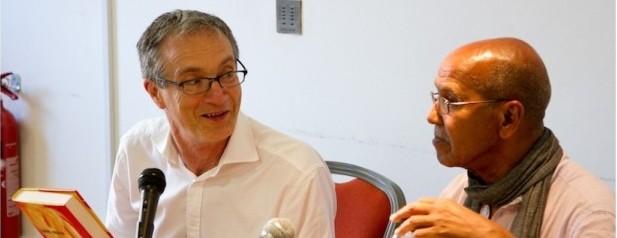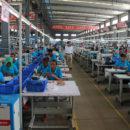Imagine if Luis Moreno-Ocampo Were to Indict President Omar al Bashir
Imagine if the Chief Prosecutor of the International Criminal Court, Luis Moreno-Ocampo, were to issue an arrest warrant against Sudan’s President Omar al Bashir on charges relating to Darfur. What would be the consequences?
The charge, the accused, the evidence and the timing are known only to the Chief Prosecutor. I have no insider knowledge of what Professor Ocampo’s next step will be and when he will take it. Hence the scenario, “What if Ocampo indicts Bashir?” is hypothetical. But it is worth pursuing.
General inferences for the direction of the investigation can be drawn from Ocampo’s presentation to the UN Security Council on 5 June. Ocampo said, “the entire Darfur region is a crime scene,” the scene of a systematic campaign that “required the sustained mobilization of the entire State apparatus.” He singled out the role of Ahmed Haroun, in what he said was the second stage of the campaign, the first having been the massacres of 2003-04 for which Haroun had already been indicted. Now transferred to be Minister of State for Humanitarian Affairs, Haroun had direct responsibility for the camps. However, the Chief Prosecutor’s target was now the individual who instructed Haroun. Ocampo said that he had evidence for “an organized campaign by Sudanese officials to attack civilians, in particular the Fur, Massalit and Zaghawa, with the objective to physically and mentally destroy entire communities.” He compared the Sudan government to the Nazis.
Ocampo also made a comparison with his native Argentina, which was ruled by a succession of four military juntas from 1976-83, during which time thousands were murdered, tortured or disappeared. When the fourth junta relinquished power, the generals amnestied themselves and destroyed or covered up much of the evidence. Despite this, Ocampo (as assistant prosecutor) and his colleagues were able to mount prosecutions against nine officials of the first three juntas, including the three former heads of state. They won five convictions and sentenced them to life imprisonment. It was the most spectacular and successful exercise in judicial accountability for gross human rights violations since the Nuremberg trials after the close of World War Two, and gave heart to the victims of such violations around the world that they could seek justice for the crimes perpetrated against them, no matter how senior the perpetrator. The parallel is instructive, not only because of the ambition of the Argentine prosecutions and the prosecutor’s skill in assembling evidence, but because Ocampo faced the counter-argument that the crimes should be forgotten so the country could focus on political solutions.
I have asked a number of thoughtful individuals with different perspectives to write on the question “what if Ocampo indicts Bashir?” and will run their contributions as they come in. We will also be accepting unsolicited contributions and comments. As readers of this blog may have noticed, I am ready to publish my critics (and, those critics may observe, even correct their grammar too).
However, I have only a limited tolerance for the trope that any criticism of the ICC is ipso facto an apology for the Sudan government. I will exercise some intellectual quality control accordingly. Bishop George Bell criticized the Allied firebombing of German cities, and it did not make him a friend of Hitler. The Ugandan mediator for the war in the north, Betty Bigombe, criticized the ICC for issuing arrest warrants against Joseph Kony, and it did not make her an apologist for the atrocities of the Lord’s Resistance Army.
My aim is to bring the challenges and dilemmas into a public debate. The possibility of the ICC indicting a serving Head of State warrants public debate.






If the hypothetical question proves to be the case it will be a critical decision given the phase that Sudan is passing through now. Then a serious question will emerge whose interests is the ICC serving? Is the Court becomes a tool to be used to punish leaders who refuse to be dictated by powerful states? It is obvious the internal demands are pushing for peace now not for justice? This doesn’t means that there are some people from inside Sudan, whom for political reasons, want to use the outcomes of the ICC in their campaign to achieve political goals. I think the effects of this move are far more dangerous to the stability of Sudan and the region, and it may have negative impact on the ICC itself especially if people perceived it as a political body not judicial one. Moreover, this move also will not improve the situation in Darfur or the Sudan in the short term, despite the potential for satisfaction amongst rebel movements in Darfur.
I might presume that there is huge pressure on the Court especially from human rights and advocacy groups who use Darfur as their breeding cow to get money from the misery of our people and they are striving very hard to keep it on the radar. One the contrary, the ordinary citizen in the desert of Darfur wants peace we should not lose sight of this reality. In the aftermath the community there has his own mechanisms for justice and healing, which is far better than westernized one in the copy of ICC.
Mohammed Hassan Babiker
Andrew Natsios has recently revealed that he has actually held a meeting with Ocampo in an attempt to draw his attention to the political implications of top level indictments. The impression he got was that the ICC “did not care” because it is not interested in diplomacy!
The ICC was formed through diplomacy. Exemptions of the Big Powers happened by diplomatic means. The way the resolution on Darfur was passed
was diplomatic(side-stepping the US reservations )
Those who understand that the Law is only punishmet should be forced to study the history of conflict resolution in Darfur. The British rulers and “Native Administration” chiefs used to hold annual reconciliation meetings in which peace was negotiated; compensation paid, captives exchanged and peaceful
coexistence resumed .Blood money (diyya) was often paid as part of reconciliation when death happened. This system is still valid in many parts of Sudan.Victims’ families sometimes pardon for the sake of peace and the judges respect that. This highly sophisticated understanding of the Law has no place in the blinkered rigidity of M. Ocampo’s approach . He is apparently not interested in future developments in Darfur where the warring parties have to live again as neighbours.
If you read the history of Luis Moreno-Ocampo you will know how he is thinking. To compare the current situation in Sudan as that of Argentina in the 80th is abig mistake. All I can say is that Luis Moreno-Ocampo is completely ignorant about the Sudan problems. At the time when the problems of Darfur are about to be resolved he came out with his decision. It gave all of us the impression that he works against Sudan rather than for Sudan. He is definitely going to lead us to a disaster in which the normal Sudanese will be the victims. While Moreno-Ocampo and those who had Darfur and hat Sudan will be laughing. The damage has already happened. Albashir popularity and support is even stronger at present and a mass destruction and tribal wars is the expected outcome. So, let this man sit a side and read about the history and geography of Sudan and not Argentine